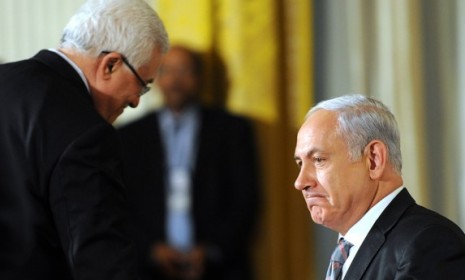Mideast peace talks: Reason to be optimistic?
The U.S.-brokered talks between Israel and the Palestinian Authority got off to a better-than-expected start — but is resolution really within sight?

A free daily email with the biggest news stories of the day – and the best features from TheWeek.com
You are now subscribed
Your newsletter sign-up was successful
The first session of dialogue in two years between the leaders of Israel and the Palestinian Authority concluded yesterday with a small triumph: Israeli Prime Minister Benjamin Netanyahu and Palestinian President Mahmoud Abbas have agreed to a series of direct talks beginning in Egypt in two weeks' time. U.S. Secretary of State Hillary Clinton expressed optimism that these talks would lead to a peace deal within a year. But even with the auspicious start, is there any hope that one of the world's fiercest conflicts can be solved in just twelve months? (Watch an AP report about the peace talks)
Against all the odds, a good start: Despite the "broad cynicism oozing out" of both the U.S. and Israel, says Daniel Stone in Newsweek, there's good reason to be optimistic. On the evidence of today, Abbas and Netanyahu are building a rapport that "lubricates the possibility for meaningful concessions." Granted, it would be "shocking, almost unbelievable," if lasting peace is achieved within a year. But this was far from a terrible start.
"How Obama could actually broker Mideast peace"
The Week
Escape your echo chamber. Get the facts behind the news, plus analysis from multiple perspectives.

Sign up for The Week's Free Newsletters
From our morning news briefing to a weekly Good News Newsletter, get the best of The Week delivered directly to your inbox.
From our morning news briefing to a weekly Good News Newsletter, get the best of The Week delivered directly to your inbox.
No talks can solve this intractable dispute: The U.S. is living in "fantasyland" if it thinks it can "broker, negotiate, or impose a just and lasting peace," says Tom Fenton at Global Post. There is no solution as long as "two ethnic groups claim to have a God-given right to the same small bit of land," and there's nothing Obama or anyone else can do to change that.
"No Mideast peace? Blame the American media"
When Hamas fears these talks, we know they're working: I had low expectations for these talks, says Richard Spencer in the Daily Telegraph, but I'm "strangely more optimistic" after this week. If Hamas is "rattled" by the talks — as the "brutal" killing of four Israeli settlers this week suggests — then I'm heartened. Hamas realizes it could be "marginalized" by these discussions — and when it is, this "phony war" may finally end.
"In the Middle East, murder is sometimes a reason for hope"
A free daily email with the biggest news stories of the day – and the best features from TheWeek.com
-
 The ‘ravenous’ demand for Cornish minerals
The ‘ravenous’ demand for Cornish mineralsUnder the Radar Growing need for critical minerals to power tech has intensified ‘appetite’ for lithium, which could be a ‘huge boon’ for local economy
-
 Why are election experts taking Trump’s midterm threats seriously?
Why are election experts taking Trump’s midterm threats seriously?IN THE SPOTLIGHT As the president muses about polling place deployments and a centralized electoral system aimed at one-party control, lawmakers are taking this administration at its word
-
 ‘Restaurateurs have become millionaires’
‘Restaurateurs have become millionaires’Instant Opinion Opinion, comment and editorials of the day